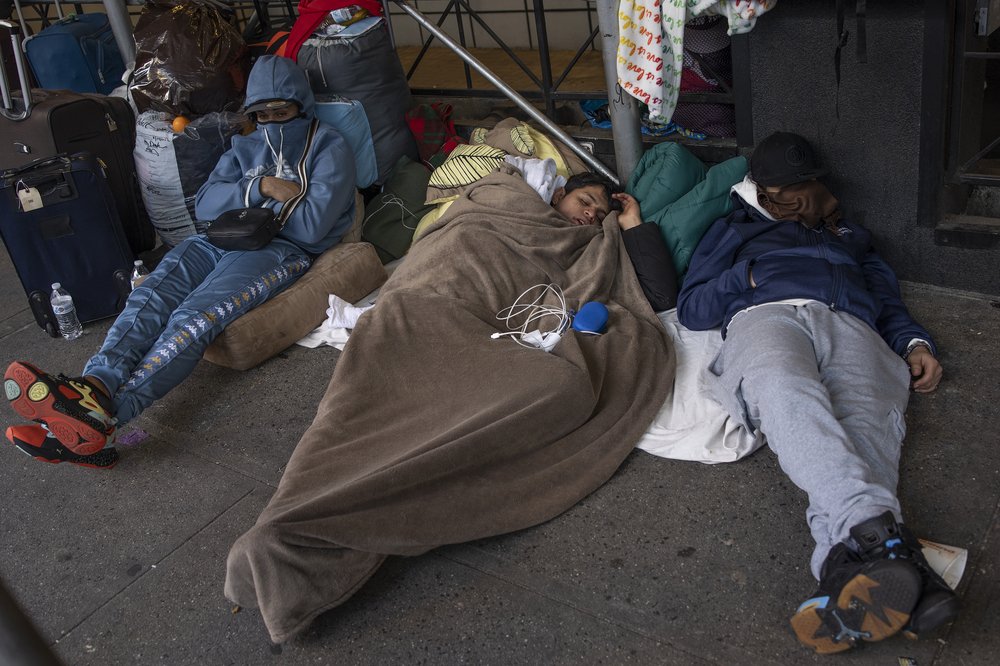Venezuelans in NY sue the Trump White House over the end of deportation protection
Feb. 22, 2025, 11:01 a.m.
One New York plaintiff who worked as an anesthesiologist in Venezuela fears being forced to return.

The New Yorker described only as plaintiff “K.F” in a new federal lawsuit had been an anesthesiologist in her native Venezuela.
The 59-year-old woman joined protests against President Nicholas Maduro's government in 2018, and eventually fled Venezuela due to growing repression.
She now lives in fear of being forced to return after the Trump administration announced the end of protection against deportation for an estimated 607,000 Venezuelans in the United States, according to a complaint filed Thursday by immigrant rights groups, including Make the Road New York.
“She is terrified of returning to Venezuela, given the persecution directed at activists and professionals perceived as activists, from forced disappearances to prolonged incarceration without food or light,” reads the claim, filed on behalf of K.F. and other plaintiffs.
The lawsuit was filed against the Department of Homeland Security and its secretary, Kristi Noem. Earlier this month, Noem announced the end of deportation relief, known as Temporary Protected Status, for Venezuelans in the United States without permanent legal immigration status.
The designation provides protection to people from nations the United States determined to be too dangerous to return to.
The lawsuit, filed in a federal court in Maryland by Make the Road New York and CASA, a national immigrant rights group, accuses the federal agency of unlawfully terminating Temporary Protected Status, or TPS.
Noem’s announcement ending TPS for Venezuelans reversed an earlier decision by her predecessor, Alejandro Mayorkas, who had extended it in the waning days of the Biden administration.
Neither the White House nor the Department of Homeland Security immediately commented on the lawsuit. In announcing the end of TPS for Venezuelans, the department said conditions had improved enough to allow nationals of that country to return. Noem also said the TPS designation had been used to allow people who otherwise didn’t have immigration pathways to settle in America.
Noem’s decision to end the program means that TPS benefits will expire on April 7, according to the Department of Homeland Security, and comes on top of a separate decision to end TPS for approximately 500,000 Haitians.
It’s unclear how many Venezuelans in New York claim TPS but a congressional report in December put the total number of TPS recipients in New York at nearly 87,000, across all nationalities. As of 2022, just under 7,500 undocumented New Yorkers were from Venezuela, according to the Center for Migration Studies.
Yatziri Tovar, a spokesperson for Make the Road, said the termination of TPS puts hundreds of thousands of Venezuelans “ in sort of a legal limbo, forcing them in a sense to either live undocumented or return to a country that right now is experiencing a humanitarian crisis.”
The lawsuit alleges that the termination was due in part to “racial animus,” stating that Noem and President Donald Trump “have repeatedly made racist remarks to attack nonwhite immigrants.”
It also argues that recent actions by Homeland Security “ignore the statutory scheme that Congress enacted” for Temporary Protected Status “and instead threaten to force lawfully admitted and TPS-eligible Venezuelans and their families to return to a country experiencing one of the worst humanitarian disasters in the Western Hemisphere.”
The U.S. Department of State currently has a “do not travel” advisory in place for Venezuela and in January the Biden White House and the Department of Homeland Security determined “that an 18-month TPS extension is warranted based on the severe humanitarian emergency the country continues to face.”
“These conditions have contributed to high levels of crime and violence, impacting access to food, medicine, health care, water, electricity, and fuel,” the Homeland Security statement reads. “Such a determination meets the statutory obligation to decide, at least 60 days before the expiration of a TPS designation, whether the conditions for designation continue to be met and merit an extension.”
- heading
- Haiti on the Line
- image
- image
- None
- caption
- body
WNYC will host a special radio program at 7 p.m. Monday called "Haiti on the Line." The special broadcast will focus on three cities — New York, Boston and Miami — which are home to the largest Haitian populations in the country. The show, hosted by WNYC's Brian Lehrer, will feature experts in both the United States and Haiti, and they'll take calls about the situation in that country and for immigrants here. For more information or to record a message that could be played on the show, click here.